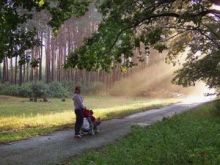Whenever we use water, log the woods, or dig coal we are guided by purely material interests and a desire to satisfy our needs at any cost. The latest report of the World Wildlife Fund (WWF) says that the human race is now consuming 50 percent more resources than the planet can give. Experts claim that various countries are exploiting nature at a different pace. For example, if we all lived like Indians do, even half of the planet’s resources would be sufficient for us. But if all lived as they do in the United Arab Emirates, the water, energy and biomass of four planets would not suffice. Ukraine belongs to the category of average-consumption countries. And if we begin to apply energy-saving and renewable technologies, we will be able to provide resources for ourselves and other countries. So we must revise our attitude to nature right now. In an interview with The Day Kateryna KURAKINA, PR manager at the Ukraine WWF office, gave a detailed account of the WWF report, focusing on the consequences of mankind’s materialist attitude to the environment.
Ms. Kurakina, how have the ecosystems of the world, including that of Ukraine, changed in the past few years?
“The condition of the planet and biodiversity is relentlessly worsening. Our impact on nature continues to grow, especially in affluent countries. If we go on behaving this way, we will need more than one planet to keep us alive, i.e., more resources than the Earth can produce.
“At the moment, we need about one and a half planets. If things go on like this, we will need two planets by 2030, 2.8 by 2050, and so on. There is also the question of the planet’s bio-productivity. So far it is stable. But the population is rising. Per capita bio-productivity is falling, so we should reduce the ecological footprint on the planet in order to have enough resources. Forecasts show that there will not be enough resources for all in the future. This especially concerns poor countries which depend very much on natural reserves. As for water, it is one of the most-quickly-diminishing resources. As the World Wildlife Fund forecasts, two thirds of the global population will have felt a moderate to acute stress by 2025 due to a shortage of water. Even now we can see that it is also a major problem for Ukraine. The problem is not only in the quantity but also in the quality of water because we do not have too much clean water. Another WWF conclusion is that we can solve the problem with a small effort. If we begin to act now, gradually changing our lifestyle and our attitude to nature, we will manage to reach a stable level within decades. What is the way out? It is a ‘green’ economy, one in which we take into account not only the economic aspects and needs of nature but also all the spheres of human activity and make sure no harm is done to nature.”
If we analyze why we have such a deplorable environmental situation, we will see that by far the most important factor is a consumerist attitude to nature. Do other factors also play a role?
“Human attitude is one of the prime movers of all that is occurring today. We have certain demands; we need food, energy, construction materials, etc. And the more we need, the more we take.”
How do you think we can switch from consumer to protector of natural resources?
“We must take a more balanced attitude to all vital functions, for example, to farming, fishing, growing and logging woods. We should not just consume until everything comes to an end but also think about the way this should be renewed. For instance, 50 percent of the population of commercial sea fish have been fully or almost fully depleted.
“Future generations to come will also need to eat, wear, etc., something. In other words one should consume moderately for nature to be able to renew itself. As for foodstuffs, it is now popular to introduce an organic economy and grow foodstuffs without the use of chemical fertilizers which heavily pollute nature and water. So one must think how to best launch a business with minimal damage to the environment, but this should be done in a systemic way. The same applies to the introduction of renewable sources of energy and a more rational construction of self-heating and self-cooling buildings. All these technologies already exist, and we should apply them to avoid problems in the future.”
The WWF report focuses on the planet’s health. What is its present state, with due account of all the existing environmental problems?
“The first indicator is the Living Planet Index, which actually covers the planet’s health. It now shows that not all regions are equally healthy. Tropical zones are the most degradated systems. The temperate zone in a slightly better condition, and it is moving in the right direction. But in the tropical regions, which supply the palm oil now used in half of supermarket-sold foodstuffs, this oil is produced at the expense of forest logging. In other words, forests, as natural systems with their own flora and fauna, are simply vanishing. As for Europe, natural systems have been destroyed and replaced with manmade ones in many countries. For example, in Holland unfettered nature has been practically destroyed and replaced with artificial systems — rivers are controlled by man, not by nature. Ukraine also has a lot of degraded lands which should be returned to the natural condition. It was a common practice to build dikes in the Soviet era: for example, the Danube and the Dnipro were diked, which upset natural processes. We should renew natural systems on the rivers because they work better, protect from floods, and increase the fertility of lands.”
And what is the international opinion about Ukraine’s ecosystem?
“It is conditioned by means of two parameters: ecological footprint and bio-productivity. For example, Ukraine’s ecological footprint is 2.9 percent of a global hectare. The per capita ecological footprint of mankind is the lands that can produce renewable resources and absorb carbon dioxide. These lands are measured by the hectare. It takes three hectares a year to produce enough resources to maintain the vital functions of an individual. In other words, global hectares are the averaged hectares that produce resources. This is a general, not a specific, piece of Earth. Therefore, ecological hectares represent the land which we need to feed ourselves and live, while bio-productivity is the land that we actually have. For example, in Ukraine there are 2.9 global hectares per individual, and the bio-productivity of our ecosystem is 1.8 hectares. Worldwide, the average figures are as follows: an ecological footprint is 2.7 hectares and bio-productivity is 1.8. In Ukraine, the levels are close to the global average. For example, in the United Arab Emirates the ecological footprint is more than 10 hectares. A special index is the carbon footprint, i.e., how much carbon dioxide Ukraine emits into the air. It is typical to make products which involve a major wastage of water, energy, and other resources. To improve things, we should reduce these losses. Other countries make the same unit of GDP with much lower losses. In other words, we can reduce these losses, which will in turn lessen our ecological footprint.”
Judging by this data, to what extent is our environment “ill”?
“What presents a major problem for us is the pollution and salinization of lands, but the regions free of economic activity remain quite healthy. These are the Carpathians and natural reserves on their territory. Lands where we carry out economic activity are in rather poor condition.”
How can we preserve the environment in Ukraine and all over the world?
“If we cut down on our consumerist habits, thriftily use resources, power, and water, this will have a positive effect on the environment. We can recycle resources, such as, for example, scrapped paper or plastic bottles. There is a very large number of small things which we can do every day, and they will produce a considerable effect. I would not like to scare you, but if we do nothing now, there will be bad consequences. There will be a shortage of resources, power, and food; the poorest and most vulnerable countries will be at the receiving end; there can even be resource wars, which will cause the planet to suffer. But still there is hope. If we all do some small things together, we will have a greater result.”








